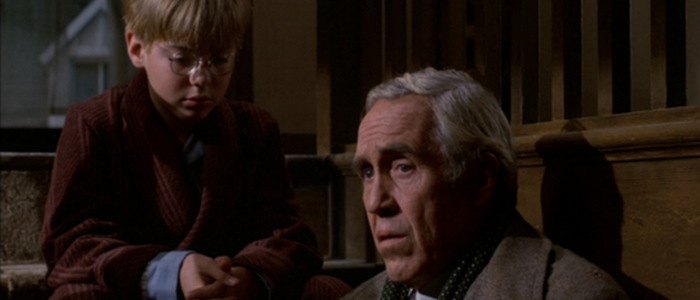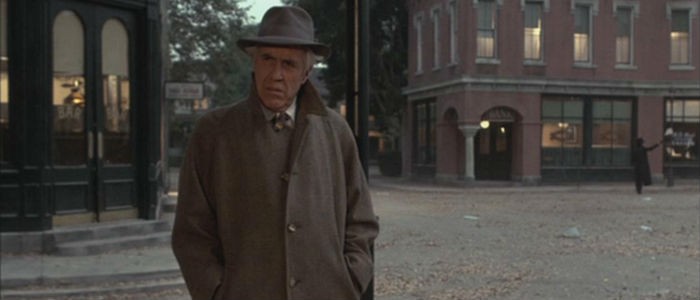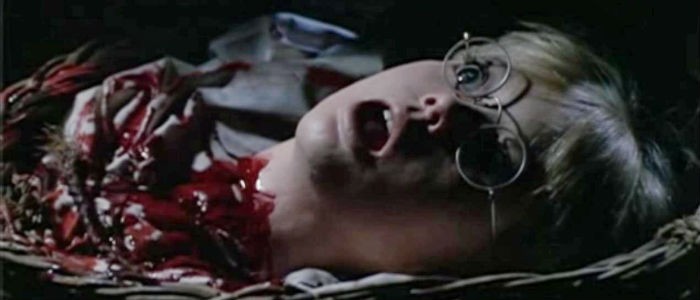'Something Wicked This Way Comes' Revisited: Does The Classic Ray Bradbury Adaptation Hold Up?
(Welcome to Nostalgia Bomb, a series where we take a look back on beloved childhood favorites and discern whether or not they're actually any good. In this edition: Walt Disney's live action adaptation of Ray Bradbury's brilliant novel, Something Wicked This Way Comes.)
"My dad disappeared on a trip to the Thousand Islands when I was thirteen years old. My father and I had to go home without him."
I wrote those lines over twenty years ago as the opening of a personal essay called "The Island of Loss and Pancakes," and while I won't burden you with the specifics of the tale the gist of it was this. My dad was once a man of vitality with a desire for exploration who'd take me boating, fishing, and camping at every opportunity, and when we weren't off cruising the St. Lawrence River, we'd be exploring altogether different frontiers with our cutting-edge Commodore 64 computer or the building of a slot-car race track hidden in the ceiling and only accessible via an elaborate system of pulleys. There was always something shared between us, something we could do together or talk about, and then one day among the islands bordering New York and Canada... there wasn't.
The passage of time and of adulthood in general had taken a toll on him, and while I didn't understand his regrets and stresses then, the effect they had on me was both immediate and long-lasting. It affected the choices I made going forward, the dreams I pursued and the ones I let pass me by, and to the (already overdue) point of this very article it changed the way I respond to certain types of stories onscreen.
Like the 1983 adaptation of Ray Bradbury's Something Wicked This Way Comes.
"Your torments call us like dogs in the night, and we do feed and feed well."
I was already a fan of Ray Bradbury's fictional creations by 1983 and had journeyed with him from a virtual African veldt to the surface of Mars, but Walt Disney's big-screen adaptation of Something Wicked This Way Comes was my first experience seeing his imagination brought to life outside of my own. As a kid with an affection for horror, I was doubly excited for the film, and I recall seeing it twice in theaters and many more times on VHS over the next couple of years. I loved its embrace of the darkness, its eerie visuals, its way with words, and the strong friendship at its core. What struck me most however, what stayed with me across the years, was the relationship between an adventurous young boy and a father who by all accounts had given up on being anything more than an observer of the life passing him by.
The film opens with a narrator describing the pull of a crisp October day, his childhood home of Green Town, and of the neighbors who gave him his "first glimpses of the needs of the human heart." Adults are obsessed with money, women, youth, and the glories of the past, but for young Will Halloway (Vidal Peterson) and his best friend Jim Nightshade (Shawn Carson) there's only the laughs, thrills, and excitement of the now. The narrator, an adult Will, recalls his father Charles (Jason Robards) as a man whose "heart was suddenly too old and too tired, and too full of yearning and regrets, and he didn't know what to do about it." Charles is a kind man and well-respected about town, but he's also become limited by his fears and regrets. Will's rush to defend his father against Jim's claim that the old man is "afraid" is as familiar to me as the boy's secret disappointment, and it added a layer to the film that couldn't have felt more personal had Bradbury peeked into my very soul while writing it.
A train arrives in the middle of the night, and when the boys sneak out to watch, they notice its engine is without a driver and its passenger cars are devoid of life. Its horn still blares, and when they chase the tracks over the hill they discover that Dark's Pandemonium Carnival has already been set-up. It's still eerily empty, though. They visit it the next day and are disappointed at first to see it resembles nothing more than an ordinary carnival, but a closer look reveals the odd effect it's having on the locals. Their needs and temptations are pulling them into Dark's grasp, and over the course of the film's first half, we see where those desires land them. The barber who lusts after women becomes the sideshow's bearded lady. The elderly teacher who yearns for her beauty and youth is made young again only to immediately go blind. The barman whose heyday as a football star was cut short by the loss of a leg and an arm sees his limbs restored but his body reduced to that of a child.
The boys see too much, including a carousel capable of aging a person forward or backward, and soon Dark is after them with a mysterious witch, a creepy red-haired child, and a nightmarish assault by tarantulas. As the adults fall by the wayside, it comes down to Will's father to stand between the boys and the fate that Dark has planned for them, but it's unclear if he's up to the task. Years prior, Charles watched as young Will splashed in a river, drowning before his eyes, and he was unable to leap in to save his son. Another man had to step forward instead, and it's that lack of action that has haunted him ever since.
"It's not what you've done that you regret, it's what you didn't do."
My own dad never failed to save me from drowning. In fact, he once leapt into the water to rescue my younger sister who had fallen overboard, losing his favorite sunglasses in the process but not complaining even for a second. He was hit hard though by the loss of the only job he ever knew, not as a librarian like Will's father, but as an accountant. Subsequent attempts to start his own businesses were allowed to crumble at the first sign of a struggle. Soon he just stopped trying. He settled and, like Charles, seemingly decided that "sometimes a man can learn more from other men's dreams than he can from his own." He read books other people had written, he played games other people had programmed, and he stopped dreaming his own dreams altogether.
These are the thoughts that sat with me on many a viewing of the film as a child and a teen, but while it weighed heavily on me throughout culminating in the moment where Will tells his father "I wish you could be happy," the film always rose back up and left me hopeful and inspired by the time the credits rolled. Dark's pursuit of the boys leads him to the library where Charles is hiding them, and in the film's most harrowing scene, the devilish carnival barker tempts the old man with the promise of youth. He rips pages from a book with increasing intensity, and with the glowing tear of each page Charles grows weaker and weaker. He never breaks though, and instead succeeds in refusing Dark's offer for another chance at life. The price of that bravado is "a taste of death" as he takes Charles' hand, breaks it in grotesque fashion, and teases him with the void that awaits him. Dark takes the boys back to the carnival with plans on reverting Will back to infancy and luring Jim into his fold, but Charles follows and once again faces the cold reminder of a death growing increasingly closer with each passing day.
The thing that breaks Charles free of his despair, the thing that should have made 13, 14, 15-year old me shake my head in disgust at its cheesiness, is the sincere uttering of three simple words. Will yells "I love you" to his dad, and the spell is broken as the words are spoken. It's an earned reunion, one that both actors sell with visible emotion and relief, and they follow it up with the realization that defeating Dark and saving Jim means letting go of despair and celebrating their joy instead. Again, it should have been silly, especially to a boy already mature enough to have seen naked breasts onscreen when his favorite aunt took him to see Stripes without realizing there would be such things projected to the size of VW Bugs, but it instead left me devastated and restored each and every time. Will's disappointment and anger towards his father disappeared with a simple admission, but as much as the scene satisfied me as a viewer, it was years before I could fully take the lesson to heart.
Even if I hadn't shared in Will's issues with his father, the film always spoke to me in regard to friendship as well. I was the toe-headed kid in glasses while my friends had no such impairments, and like Will, I watched as those friends developed an active interest in more touchable partners before I followed suit. (See the previous description of me as a toe-headed kid in glasses...) Seeing Will grow perturbed by Jim's prurient desires distracting them from adventure was a familiar feeling, but so was seeing the pair come back together as if nothing could hold them apart for long. Dark's attempts to splinter the pair by bribing them with adulthood and all the experience and power that comes with it was ultimately little more than a temporary distraction and no real threat to their friendship. It's a fantasy, but it's one I happily bought into at the time with the friends I knew would always be there and who I no longer see.
Does It Hold Up?
Absolutely, with a couple caveats. Watching it recently as both an adult and a film critic, there are two areas that are less effective now than they were then. The first is simply an issue of time's passage and technology's improvements as the film's special effects bear the unmistakable glare of hand-drawn "electricity" and early '80s opticals. The practical work, from Dark's decaying form to the boy's severed head, are still aces though. The second area lacking to my older and wiser eyes is the ending, which feels rushed and jumbled. If Twitter was around back then, I expect it would have been filled with rumors and reports of re-shoots and editing room mayhem, but as it stands, I'll simply have to assume such things.
Every other aspect of it remains strong and effective, from its capturing of childhood's tastes and smells to the ruminations on mortality and regret. It's a reminder of when kids movies were about more than farts and wise-cracking animals, and its visuals retain their power to unsettle and unnerve. No kids movie these days would feature a shot of the child's own bloodied and severed head in a guillotine basket. Dark and company's slow parade down main street lacks graphic thrills, but it's a terrifying stroll all the same, complete with child-sized coffins. And did I already mention that tarantula scene? Eesh.
There's also my increased awareness of the players involved including, director Jack Clayton, whose The Innocents is an even more effective chiller, and the presence of Pam Grier as the Dust Witch. The tale also bore a clear inspiration on other favorites of mine, from Stephen King's Needful Things to Clive Barker's Books of Blood (by way of Dark's swirling arm tattoos as narrative tools).
As for whether or not it holds up in the areas where it most affected me as a child and teenager, the answer is yes. My dad returned several years after I first lost him, and while he never quite regained that adventurous spirit or roaring ambition, he appeared to have made peace with himself. Like Charles fighting despair and darkness with laughter at the end of the film, my dad remembered the value in being joyful and goofy. Sure, much of what we joke about is the fact that he's a fan of Fox News, but progress is progress. Watching the film now, I appreciate Bradbury's language and the craftsmanship behind the production, but I also connect with the entire journey, both the dark and the light, both the loss and the eventual triumph over evil. The lasting "gift" from that time, the element that first appeared with my viewings of Something Wicked This Way Comes, is that to this day the surest way for a film to bring me to tears isn't through a sad death or romantic tragedy. It's in the appearance of a grown man, a father, feeling weak and helpless before the ones he loves.
"He'd made a memory that would live as long as sons tell sons about fathers they love," says the adult Will about his father as the film fades to black. I don't have a son of my own, but watching the film again is a reminder that I shouldn't wait to tell my dad that I love him. And yes, that I'd love him even more if he turned the channel over to CNN once in a while.



